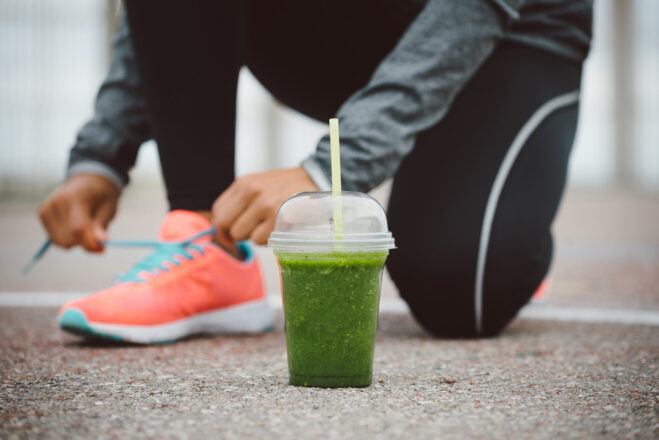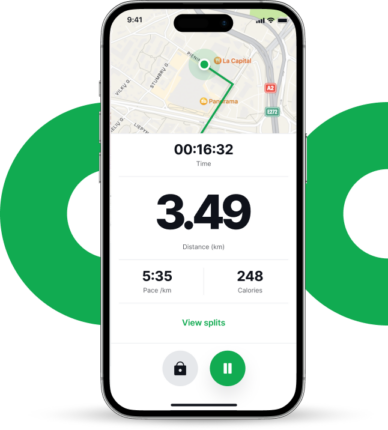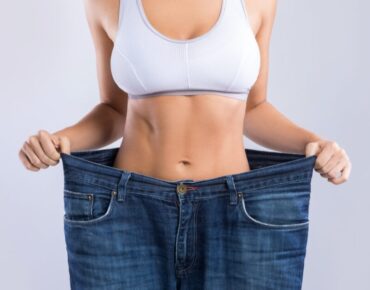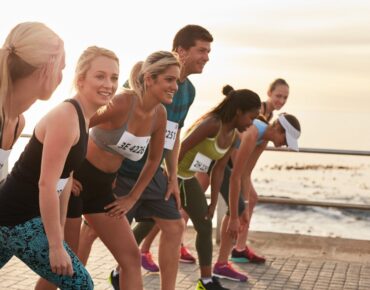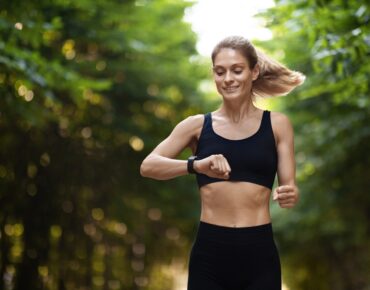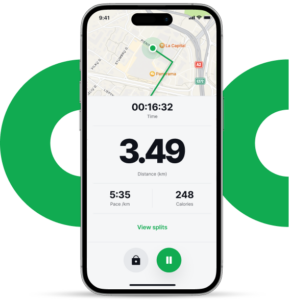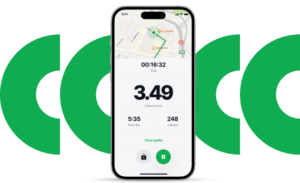The right diet for runners can boost your endurance during a long run and help you lose weight in a healthy and natural way.
Running to lose weight doesn’t mean fasting or skipping important meals of the day. It means making the right dietary choices—before, during, and after runs and workouts.
If you want to increase your metabolism and burn calories as you run while also building endurance, you have to eat right.
Read on to explore the best diet for runners to lose weight and find out what foods you should be eating more often.
In This Article:
Diet Plan for Runners
A healthy runner’s diet is often low in bad carbs and high in protein and healthy fat, fruits, and vegetables. It also provides enough water to ensure hydration.
Whether you favor an anti-inflammatory diet, keto diet, Atkins diet, or some other low-carb diet for runners, you can add to it many of the foods we’ll be covering in this article.
Before we take a closer look at the foods you should be eating to boost your strength to weight ratio and endurance, let’s start with some essential guidelines for establishing healthy eating habits.
Carbohydrates
Running is often moderate-to-high intensity exercise, which means your body burns carbs rather than fat for energy.
According to the latest USDA Dietary Guidelines for Americans, healthy adults need to get 50% of their total energy from carbs. As an endurance runner, you can supplement that by 5-15% according to Stanford Health.
Depending on who you’re asking, this amount of carbs may qualify as a low-carb diet. That said, you need to beware of very low-carb diets which may fail to provide the fuel for running that you need.
Carbs are important when running to lose weight. Carbs from whole grains, vegetables, and fruits can help you control your weight by providing fiber that makes you feel full on fewer calories. Alongside low-fat dairy products, these are the best carbs to eat as a runner.
Tip: One to three days before long-distance runs or a marathon, you can increase your carbs intake to up to 12 grams per kilogram of your weight. This is called carb-loading and can provide you with energy while also boosting your metabolism and helping you lose weight.
Protein for muscle building
As a runner, you also need to take in more protein a day than the average person, up to 1.29 grams per kilogram daily according to some studies.
To be on the safe side, you can increase this to 1.5 grams per kg per day, or at least 15% of your total calories.
You want to vary your protein sources, especially if you are a vegan or vegetarian and don’t eat meat all that often.
Dietary fat for better food absorption
Training at a lower intensity encourages your body to use fat more efficiently as fuel. However, it’s important to eat healthy fat too and not just load yourself with carbs and protein.
You want less than 30% of your calories to come from fat, according to most dietary guidelines. It’s especially important to limit saturated fats to 10% of your calorie intake—beyond that, your heart may be at risk.
Fruits & Vegetables
Eating lots of fruits and vegetables can have a host of health benefits including fueling your performance, speeding recovery, and giving you valuable nutrients for runners like Vitamin A and Vitamin C. Everything from broccoli to watermelon and zucchini squash are good additions to your diet.
Fruits and veggies are great for your immunity too because of their high antioxidant content. Some foods are better for runners than others, and we’ll talk about them in a bit.
As a general rule, eat brightly colored fruits and vegetables every day—eat the rainbow, as they say.
Water
Hydration is crucial when you run and train. When thinking about your runner’s diet, it’s crucial to factor in your daily fluid intake. Did you know that just a 1% decrease in hydration reduces performance?
As a runner, you want to drink one liter of water for every 1,000 calories you burn. This means having a water bottle to keep you hydrated during training and runs.
Staying hydrated is crucial when running in the heat so don’t forget to supplement your water intake during summer runs.
Best Foods for Runners
So, what are the best foods for runners you can add to your breakfast, lunch, dinner, as well as use as a snack in between runs? Check out our science-backed food list and meal ideas.
Oats
Oats have a low glycemic index, pack plenty of fiber, and are a rich source of carbohydrates.
Rolled oats porridge has the lowest glycemic index of all breakfast cereals, making it a smart choice for keeping blood sugar levels in check and helping you lose weight.
What’s more, oats are a versatile choice you can combine with other healthy foods like berries, nuts, yogurt, and seeds.
Peanut Butter
Peanut butter packs monounsaturated fatty acids and polyunsaturated fatty acids—healthy fats for runners. Research has associated it with lower cholesterol levels.
Compared to eating raw peanuts, peanut butter is easier for your body to digest and may absorb more nutrients from it.
Tip: Make sure to choose peanut butter without added fats, sugar, or other additives.
Plain Yogurt
Probiotics should also be part of a healthy and balanced diet for runners, and plain yogurt is a good choice for several reasons. It increases healthy bacteria in the intestinal barrier and has other positive effects on your immune system. It has calcium which helps build bone. It’s also a rich source of protein. What’s more, low-fat yogurt has protein and carbs that can speed up recovery.
Killing unwanted fat becomes easier when you opt for naturally low-fat options like plain yogurt over other protein-rich foods.
Tip: Add fresh or frozen fruits to plain yogurt to get a healthy dose of antioxidants without the sugar and other additives in fruity yogurts.
Whole Grains
Whole grains are a rich source of carbohydrates and B vitamins. They are a primary source of fuel for your body and can help with the building of muscle.
Your body stores glucose in the form of glycogen and breaks it down when you need a quick boost of energy—such as when you run or train.
Eating whole grains helps increase your glycogen store and gives you the energy you need to keep running. Unlike processed grains, whole grains have a lower glycemic index and pack more nutrients and fiber, making them a much healthier choice for runners.
Keep this in mind next time you have to choose between white bread and whole-grain bread or between white rice and whole-grain rice!
Coffee
Coffee can boost your running performance, according to this study. You can see results by taking in between 3 to 8.1 mg of caffeine from coffee per kg.
Coffee can also help you lose weight when running by increasing your metabolic rate by up to 11% and fat burning by as much as 29%. Caffeine in coffee breaks down fat in your body, making it available as fuel.
Not all coffee has the same amount of caffeine, though. Drink good coffee before high-intensity integral training to see results.
Sweet Potato
Sweet potatoes have a low glycemic index, pack around 86 calories per 100 grams, and are a good source of complex, slow-burning carbs, fiber, and essential nutrients.
They’re a great way to carb up without too much starch. Plus, they are rich in beta carotene, which gives them their color and which can protect your skin from the sun when running in the heat.
Avocado
One cup of sliced avocado equals twice as much potassium as the average banana. Potassium is an important electrolyte you sweat out as you run—without it, your endurance suffers and you may get muscle cramps.
Potassium could also help with weight loss by preventing the build-up of unnecessary fluid around cells in your body.
Eggs
Not a vegan? Consider adding eggs to your runner’s diet. They are a great source of energy, protein, B vitamins, and have antioxidants too.
And let’s not forget about Vitamin D, which few other foods contain in good doses. Eggs can help you build lean muscle while avoiding unhealthy calories and fats.
Tip: Cook eggs to maximize their bioavailable protein from 51% to around 91%.
Berries
Blueberries and goji berries are impressive sources of antioxidants such as anthocyanins that could protect you against infection and help you recover faster after intensive workouts.
Berries can also limit the build-up of plaque in your arteries, promoting a healthy heart. Strawberries, cranberries, and blackberries are other great berries for runners. They are rich in nutrients that fight free radicals and inflammation.
Nuts
Nuts are an excellent source of protein, fiber, and unsaturated fat—all of which you need to keep running at your best.
The protein in nuts helps with muscle recovery. Eating nuts regularly leads to a lower level of inflammation in the body, which can reduce your risk of injuries.
Walnuts, cashews, almonds, and pistachios pack plenty of nutrients as well. Most other nuts are good for runners.
What’s more, research indicates that eating nuts as part of a Mediterranean diet aid with fat loss by reducing waist circumference.
Last Words on Diet for Runners
The foods we’ve talked about so far are some of the best foods before running as well as after intense workouts. They provide pre-workout fuel without weighing you down—provided of course you eat them at least an hour or two before you run.
As a runner, it’s important not only what you eat, but also what you don’t eat. Watch what you eat and drink and pay attention to the nutrients and electrolytes you are taking in—or missing.
Try Different Options
You can combine different foods into a pre-run recipe or post-run recipe you can create at home. Try all the foods on our list and experiment with different fruits and veggies.
Listen to your body to see how it reacts to them. Your body will tell you what foods work best for you.
Treat Yourself
Remember that you have to enjoy the foods you eat. If a food is healthy but you don’t like it—did anyone say broccoli?—don’t force yourself to eat it. There are many alternatives out there! Pick something else.
Tip: After an intense workout or long run, reward yourself with some of your favorite healthy foods for runners.
Enjoy Your Food
Give yourself enough time to enjoy the foods on your runner’s diet. Having regular, unhurried meals is important for good digestion. It will help your intestines absorb the most nutrients.
Supplements for Runners
With so many great foods around, do runners need supplements? The pace of modern life, time constraints, and other factors can make it difficult to eat optimal meals all the time. Also, as a runner, you have higher dietary requirements than less active people so that every calorie and protein counts.
The best supplements for runners can boost your endurance and muscle and joint recovery, supplement your vitamin, iron, and electrolyte intake, and give you more energy for longer distances.
Many runners opt for protein and weight loss supplements. But don’t forget about electrolytes like potassium, which can reduce blood pressure and prevent muscle cramps.
At the end of the day, supplements are not a substitute for a healthy diet, but they can give you the extra boost you need to run and feel at your best. Plus, they’re quick and easy to take. And when they are all-natural, they work in harmony with healthy dietary choices. So, time to try them?
Frequently Asked Questions
What kind of diet should a runner be on?
A runner’s diet should be high in carbohydrates, moderate in protein, and low in fat. Carbohydrates are the main source of energy for running, so it is important to eat plenty of complex carbohydrates such as whole grains, fruits, and vegetables. Protein is also important for repairing and building muscle tissue, so it is a good idea to include lean protein sources such as fish, poultry, and beans in your diet. Fat is not essential for running, but it can provide a feeling of fullness and help you absorb fat-soluble vitamins. However, it is important to limit your intake of saturated and unhealthy fats.
What foods are good for running?
Here are some specific foods that are good for runners:
- Whole grains: Whole grains such as oatmeal, brown rice, and quinoa are a good source of complex carbohydrates and fiber.
- Fruits: Fruits are a good source of vitamins, minerals, and antioxidants.
- Vegetables: Vegetables are a good source of vitamins, minerals, and fiber.
- Lean protein: Lean protein sources such as fish, poultry, and beans are a good source of protein and other nutrients that are important for runners.
- Healthy fats: Healthy fats such as avocados, nuts, and seeds can provide a feeling of fullness and help you absorb fat-soluble vitamins.
What is an anabolic diet for runners?
An anabolic diet is a diet that is designed to promote muscle growth and repair. It is typically high in protein, moderate in carbohydrates, and low in fat. An anabolic diet for runners may include the following foods:
- High-quality protein sources: Chicken, fish, eggs, legumes
- Complex carbohydrates: Whole grains, fruits, vegetables
- Healthy fats: Avocados, nuts, seeds
- Branched-chain amino acids (BCAAs): BCAAs are a type of amino acid that is found in high levels in muscle tissue. They can help to promote muscle growth and repair.
What is the DASH diet for runners?
The DASH diet is a diet that is designed to lower blood pressure. It is typically high in fruits, vegetables, and whole grains. A DASH diet for runners may include the following foods:
- Fruits: Berries, citrus fruits, apples, bananas
- Vegetables: Dark leafy greens, broccoli, carrots, tomatoes
- Whole grains: Brown rice, quinoa, oats
- Lean protein: Chicken, fish, beans
- Low-fat dairy: Milk, yogurt, cheese
- Nuts and seeds: Almonds, walnuts, sunflower seeds
Additional tips for a runner’s diet
- Eat regular meals and snacks: This will help to keep your blood sugar levels stable and prevent you from feeling hungry and irritable.
- Stay hydrated: Drink plenty of fluids, especially water, before, during, and after your runs.
- Eat a balanced diet: Make sure to include a variety of foods from all food groups in your diet.
- Avoid processed foods: Processed foods are often high in unhealthy fats, sodium, and added sugars.
- Listen to your body: If you are feeling tired or unwell, it is important to rest and refuel.
By following these tips, you can create a diet that will help you reach your running goals and improve your overall health and well-being.
What are the best snack foods for runners?
The best snack foods for runners are those that are high in carbohydrates and protein. This will help to provide you with energy and help you to repair and build muscle tissue. Some good snack options for runners include:
- Bananas
- Nuts and seeds
- Greek yogurt
- Whole-wheat crackers with hummus
- Trail mix
How much should a runner eat before a run?
The amount of food you should eat before a run will depend on the length and intensity of your run. In general, it is a good idea to eat a light meal or snack about 2-3 hours before your run. This will give your body time to digest the food and provide you with energy for your run.

